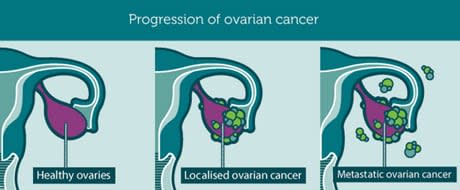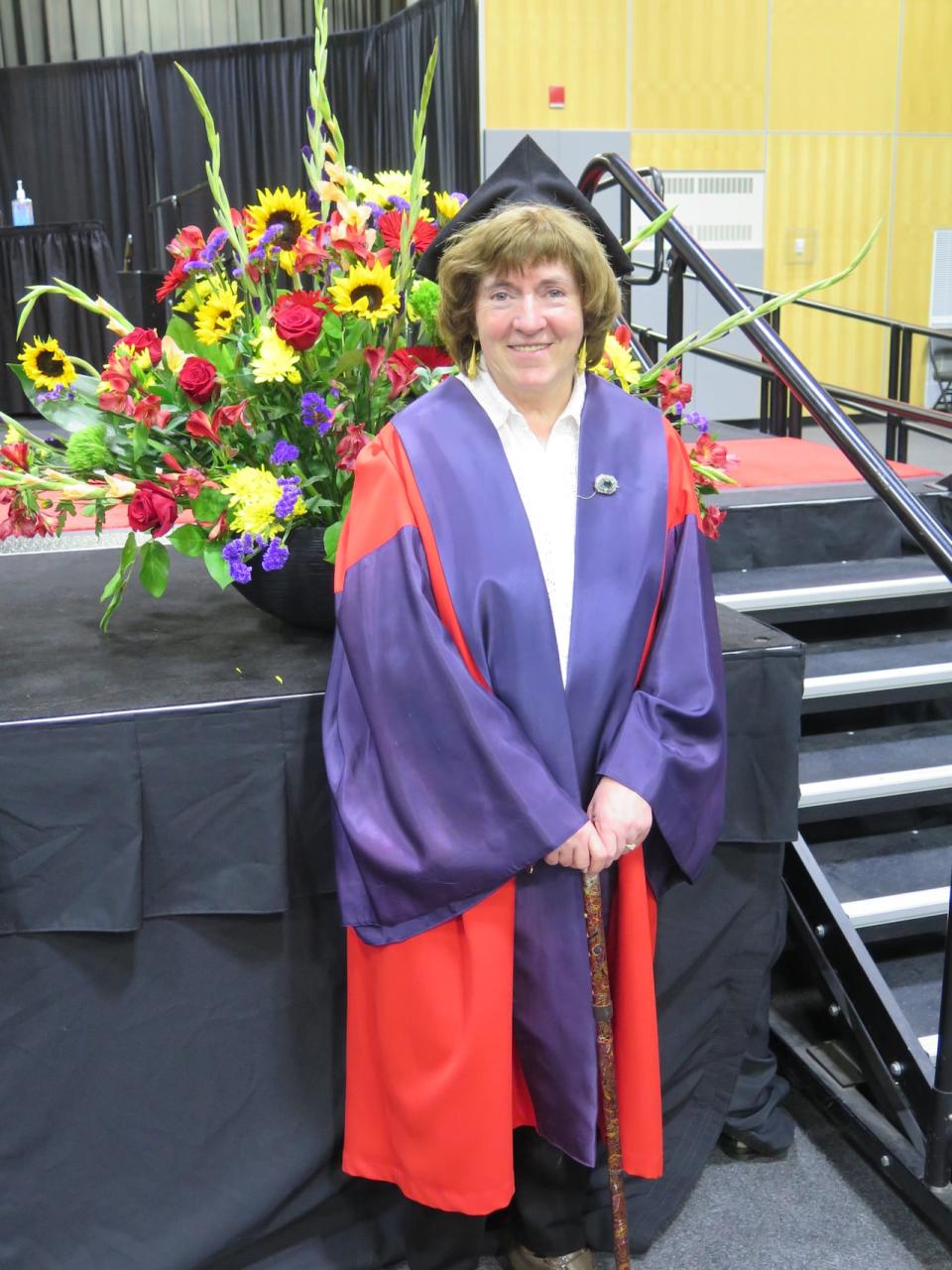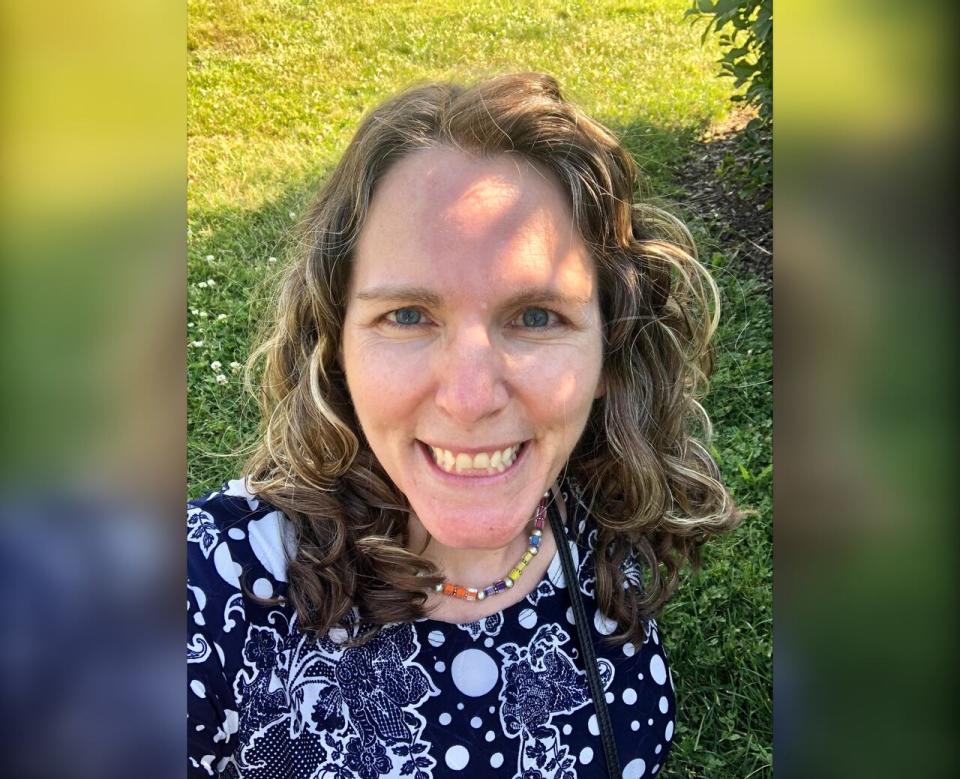Fredericton woman with terminal ovarian cancer warns others of risks

The "cancer that whispers" is what ovarian cancer is often called.
That's because of its often subtle symptoms and a lack of effective screening for women who are at routine or low risk of ovarian cancer.
But there may be a method of risk reduction called an opportunistic salpingectomy, which refers to the removal of the Fallopian tubes during another surgery.
It's something that retired University of New Brunswick professor Diana Austin is trying to raise awareness about, prompted by her own experience.
"If anything I say can help a young woman help herself from ending up in the position that I'm in, it's been worth it," she said.

A graphic shows the difference between healthy ovaries and ovaries with localized and then metastatic cancer. There are no effective tests for early ovarian cancer screening and symptoms are very subtle. (World Ovarian Cancer Day)
Last June, Austin, who has multiple sclerosis, was training for her annual trip to the Swiss Alps where she pushes herself on the mountain trails.
She was logging her exercise in preparation for the trip when she started experiencing breathlessness.
Austin saw her doctor, who set up various cardiac tests, but when the breathlessness got worse she went to the emergency room because heart problems are common in her family.
She said multiple tests were done and all came back fine, until the CT scan results were delivered by her doctor.
"He said, 'Diana, I hate to tell you but ... you've got Stage 4 terminal ovarian cancer," she recalled.
"He said, 'Your lungs are full of shadows. I was hoping they might be blood clots.' And I thought, when a doctor hoped for blood clots, that's a really bad sign."

Austin, who became professor emerita in 2017 for her contributions to academia, is using whatever time she has left to raise awareness about the procedure that could save lives. (Submitted by Diana Austin)
She was told the cancer had metastasized everywhere, with tumours all through her abdomen, lungs and in some of her lymph nodes.
"He said, 'I'm really, really sorry.'"
Austin said she tried not to cry as she listened. She felt for the doctor who had to deliver this news to someone who just wanted to be healthy enough for a trip to Switzerland.
On the way home that day, Austin and her husband stopped for a bottle of Sussex Golden Ginger Ale, a comfort drink from her childhood, and the two sat on the couch, just crying.
While waiting to see specialists, Austin found herself looking up how much time she had left to live. She saw a range of answers, from days, weeks,or more unlikely, months.

Austin, seen here on top of Gornergrat Mountain in 2015, always took annual trips to the Swiss Alps. During her training for last year's excursion, breathlessness sent her to the emergency room. (Submitted by Diana Austin)
She caught herself looking at expiration dates on food. She picked up a container of yogurt one day and noticed an expiry date just three weeks away.
"It suddenly occurred to me … that yogurt's got a longer expiry date than I may have."
Fallopian tube removal reduces risk
Dr. Christa Mullaly, an obstetrician and gynecologist in Fredericton, said one in 75 women will be diagnosed with ovarian cancer in their lifetime and most of the time, it shows up at an advanced stage.

Dr. Christa Mullaly, an obstetrician and gynecologist at the Dr. Everett Chalmers Hospital in Fredericton, said one in 75 women will be diagnosed with ovarian cancer in their lifetime. (Submitted by Christa Mullaly)
She said some women have a genetic predisposition, the BRCA1 or BRCA2 cancer mutation, associated with breast and ovarian cancers. Lynch syndrome is also associated with uterine, ovarian and certain colon and other cancers.
The opportunistic removal of Fallopian tubes first started being talked about around 10 or 12 years ago, Mullaly said, but there wasn't anything definitive.
She said the Society of Obstetricians and Gynaecologists of Canada released a statement several years ago, followed by a guideline in 2017, which talked about methods of risk reduction for ovarian, Fallopian tube and peritoneal cancers for the general population.
She said the statement recommended doctors have a discussion with adult patients who don't want anymore children and are scheduled to undergo a hysterectomy or tubal ligation about how removing the Fallopian tubes could reduce the risk of high-grade serious ovarian cancers.
"I haven't done a gynecologic surgery on a patient, who didn't want future pregnancies, without removing their Fallopian tubes in probably eight years or more," said Mullaly.
As for Austin, who has defied the odds since her terminal diagnosis, she is using whatever time she has left to warn others about the "cancer that whispers" and raise awareness about the procedure that could save lives.
"They don't have to be hopeless victims waiting for this thing to hit."

